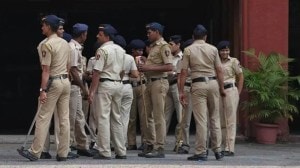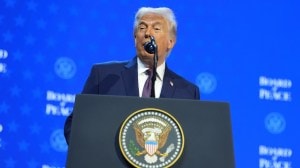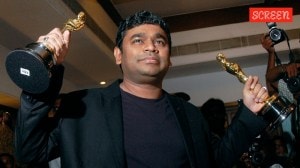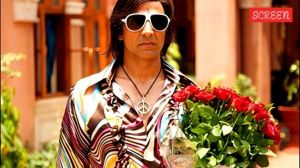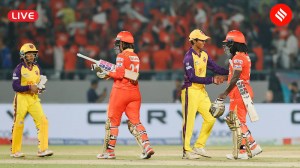Veteran on the block
The Holly Lodge, atop Jakhoo Hill, has suddenly come alive in the last few days with the beating of dhols drums, the blowing of trumpets a...

The Holly Lodge, atop Jakhoo Hill, has suddenly come alive in the last few days with the beating of dhols drums, the blowing of trumpets and the chanting of hymns. As you arrive closer to this heavily guarded mansion, tucked away in a salubrious section of Shimla, you witness the dance by 8216;natis8217; Himachali folk dancers. The all-day, all-night party is celebrating the appointment of the former Raja of Bushehar, Mr Virbhadra Singh, as the chief minister of this hill state for the fifth time.
Amidst this celebration, Singh is a worried man. A landslide victory for the Congress has brought along with it enormous expectations. The problem is compounded given the state of near bankruptcy of the treasury. The state faces a debt of Rs 15,000 crore. It was little over Rs 6,000 crore when the BJP government under Prem Kumar Dhumal had taken charge in 1998. In the last five years, the state government borrowed heavily to the tune of 9,000 crore. The situation is so precarious that there would be no money available even to pay the salaries of the over three lakh state government employees after March.
Singh8217;s biggest handicap is that there exists a hostile government in the Centre. Whenever former Chief Minister Prem Kumar Dhumal faced a financial crunch, the Centre would give it special loans.8216;8216;Now Singh will not be able to bring that kind of money, leading the state further into a deeper financial crisis,8217;8217; says a senior BJP leader.
The new chief minister, however, claims that 8216;8216;the Vajpayee government can not ignore the state entirely and all the dues which are the rights of people of the state would have to be given to the state8217;8217;.8216;8216;Though I understand that the NDA government will not go beyond its means to help us to come out of the crisis. But whatever is the right of the state they can not deny,8217;8217; says Singh.
Behind that confidence Singh packs years of experience. During his second tenure as CM 1984-89, Singh undertook the task of registering thousands of children who were denied primary education. This helped the state government achieve 76 per cent literacy, the highest in North India. During his third-term 1993-98, Singh carried out 100 per cent vast electrification of the state.
8216;8216;His feudal temperament, his aggressive attitude and his inflexible style of functioning created too many foes for him which finally let to his defeat in 1988,8217;8217; confides one senior Congress leader.
Former DG police, R R Verma, however, disagrees: 8216;8216;Virbhadra Singh thinks big and acts big. He is a person with a touch of royalty and yet has a streak of humility.8217;8217;
In the absence of aid from the Centre, Singh plans to invite foreign capital in a big way. 8216;8216;Many foreign corporate house are willing to invest in the state, we will ensure that they get proper infrastructure and a cordial atmosphere,8217;8217; he promises. A special department will encourage FDI.
His biggest problem is the state8217;s 11 lakh unemployed youth. Job generation will be our number one priority claims Singh. 8216;8216;Development of small hydel projects, and strengthening of the tourism industry will generate ample employment opportunities,8217;8217; says Singh.
Even as he has big plans for improving the economy, Singh is aware that if he does not deliver soon it will take very little time for the popular expectations to turn into a popular rejection like the one he faced in 1998.
|
Interview of Virbhadra Singh
|
||
|
Story continues below this ad For the 69-year old former Raja of Bushehar, Virbhadra Singh, becoming chief minister of Himachal Pradesh is nothing new. He has been chief minister of the state for 12 long years, besides being a four-term MP. However, this English graduate from St Stephens8217;s college now has to learn a new language: the language of economics. In an exclusive interview with Dharmendra Rataul of , Singh, on his first day in office, explains how he plans to tackle the economic crisis. Q: What will be your roadmap for the next 100 days? Q: Will you set up special commissions to inquire into the deals of the Dhumal government? Q: Will you withdraw the various cases of corruption registered against you in the courts. Story continues below this ad Q: What is the nature of the economic crisis facing the state? Q: Is external indebtedness the only problem? Q: What remedies have you thought of? Q: But as a first step, who will help you overcome such a crisis? nbsp; |
- 01
- 02
- 03
- 04
- 05








